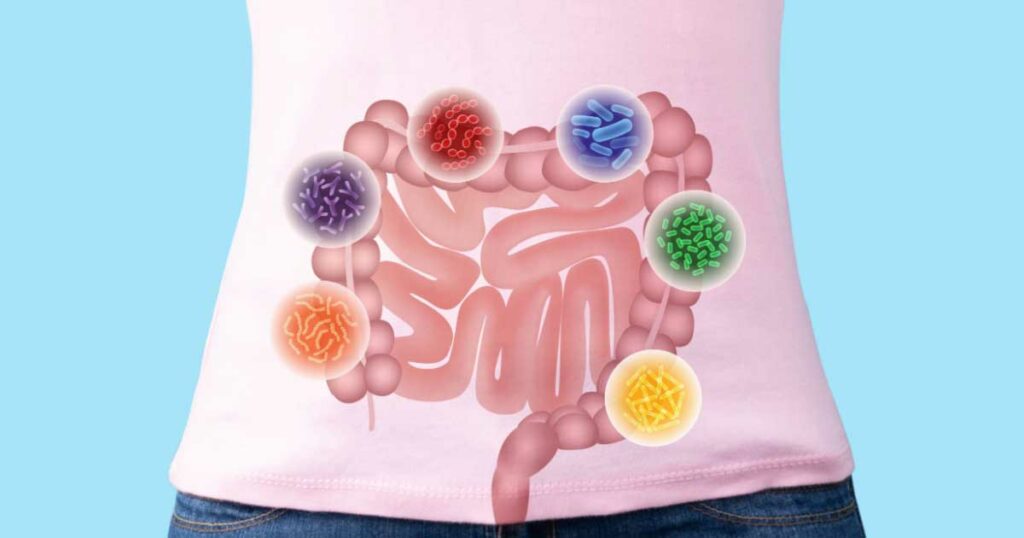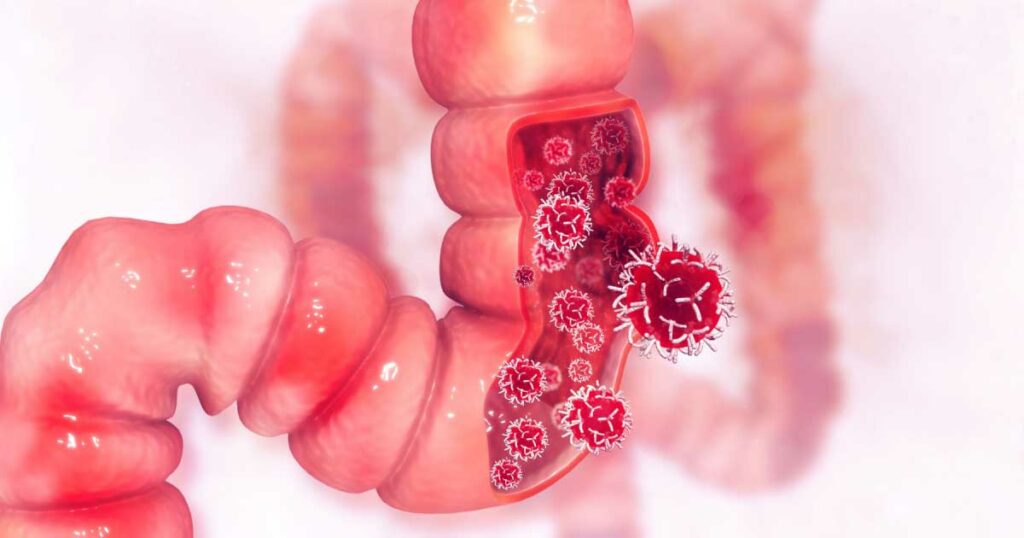Gut bacteria, also known as the microbiome, refers to the trillions of microscopic organisms that reside in our digestive tract. These organisms, including bacteria, viruses, fungi, and other microbes, play a crucial role in our overall health and well-being. If these bacteria are out of balance, it can cause illness and disease. These are the diseases caused by a damaged gut microbiome and how to keep yours healthy.
Understanding the Role of Gut Bacteria in Our Health

The gut bacteria are involved in various essential functions within our body. They aid in digestion, produce essential vitamins and nutrients, support the immune system, and even influence our mood and behavior. In recent years, scientists have discovered that imbalances or disruptions in gut bacteria may contribute to the development of several diseases and health conditions. These are 11 diseases that have been linked to damaged gut microflora. (1)
1. C Difficile Infection

One classic example of a disease that originates in the gut microbiome is a C. difficile infection. This bacteria causes symptoms such as diarrhea, stomach cramps, fever, and, in severe cases, kidney failure. The infection often occurs in individuals who have taken strong antibiotics, which disrupt the balance of bacteria in the digestive tract. When the microbiome is disrupted, opportunistic pathogens like C. difficile take advantage of the weakened gut environment. (2)
2. Colon Cancer

Toxins produced by certain types of gut bacteria, such as E. coli and B. fragilis, can combine in the colon and damage DNA, potentially leading to the development of colon cancer. Scientists have been studying this link and hope that it may lead to the development of tests that can identify patients who should be closely monitored for colon cancer. Additionally, this research may pave the way for the development of a vaccine that can protect against colon cancer. (3)
3. Irritable Bowel Syndrome (IBS)

IBS is a chronic digestive disorder characterized by extreme abdominal discomfort, as well as symptoms of diarrhea or constipation. While the exact cause of IBS is not fully understood, research suggests that the gut microbiome plays a role in how fast the digestive system moves digested material along. Imbalances in gut bacteria may contribute to the development or perpetuation of IBS. Fasting has shown some potential in alleviating symptoms, indicating that diet and gut bacteria interactions may play a significant role. (4)
4. Inflammatory Bowel Disease (IBD)

IBD, including Crohn’s disease and ulcerative colitis, is characterized by chronic inflammation in the digestive tract. People with IBD have been found to have a different microbial composition in their gut compared to those without the disease. Certain bacteria in the gut may contribute to inflammation and interact with the immune system, leading to flare-ups of IBD. Fecal transplants have been explored as a treatment option, but further research is needed to optimize their effectiveness. (5)
Read: Fibromyalgia Linked To Nearly 20 Different Kinds Of Gut Bacteria
5. Multiple Sclerosis (MS)

Recent studies have found evidence linking gut bacteria to the development of multiple sclerosis (MS). Researchers have identified certain bacteria that are more common in MS patients, and these strains can cause cellular changes in healthy blood, increasing the risk of an autoimmune response. This suggests that the microbiome might play a role in promoting an inappropriate immune response in other parts of the body beyond the gut. (6)
6. Rheumatoid Arthritis (RA)

Rheumatoid arthritis is an autoimmune disease that primarily affects the joints, but can also impact other organs. Researchers have discovered that individuals with RA are more likely to have specific rare species of bacteria in their guts compared to healthy individuals. Studies with mice have shown that transplanting a healthy strain of bacteria into mice with RA improved their symptoms. While the exact mechanisms are not fully understood, these findings indicate that the microbiome may play a role in stimulating the immune system to attack the body’s tissues. (7)
7. Allergies

Allergies, including reactions to pollen, food, and other substances, have been linked to immune problems related to the microbiome. Some researchers propose the hygiene hypothesis, which suggests that modern children growing up in extremely clean conditions indoors are not exposed to a variety of bacterial strains, leading to an overactive immune system. Other research suggests that lifestyle, environmental exposure, urbanization, diet, and antibiotic use can affect the composition of the microbiome, leading to an increased risk of allergies. (8)
Read: Newly discovered species of bacteria may be culprit behind rheumatoid arthritis
8. Obesity

Researchers have been studying how the microbiome may influence weight gain and obesity. Some strains of gut bacteria are more efficient at extracting calories from food, while others can trigger the release of hormones that increase hunger. While the direct contribution of gut bacteria to obesity is complex and multifactorial, it is evident that the composition of the microbiome and its interactions with the body play a role in weight regulation. (9)
9. Diabetes

In patients with diabetes, dietary fiber has been shown to improve blood sugar processing. It is believed that dietary fiber nourishes specific gut bacteria that influence insulin, the hormone responsible for blood sugar regulation. A healthy, fiber-rich diet is essential for promoting the growth of beneficial gut bacteria and maintaining balanced blood sugar levels. (10)
10. Heart Disease

Recent research has focused on how the microbiome can influence heart disease. Certain bacteria in the gut can produce chemicals that interfere with the breakdown of cholesterol, potentially contributing to the development of heart disease. The interaction between the microbiome and cardiovascular health is an area of ongoing investigation. (11)
11. Mental Illness

The chemicals produced by gut bacteria can act as neurotransmitters and send signals through the nervous system, potentially impacting mental health. Studies in mice have shown that introducing healthier strains of bacteria can improve behavior related to depression, anxiety, and even autism. Researchers are hopeful that similar treatments for mental illness in humans can be developed. (12)
Read: How to Kill The Bacteria Causing Heartburn and Bloating
Promoting Healthy Gut Bacteria

Maintaining a healthy gut microbiome is vital for overall wellness. Here are some strategies to promote a healthy gut bacteria balance (13):
- Eat a balanced diet: Consume a variety of whole foods, including fruits, vegetables, whole grains, and lean proteins. A diverse diet helps support a diverse microbiome.
- Include fiber-rich foods: Dietary fiber nourishes beneficial gut bacteria. Incorporate foods like fruits, vegetables, legumes, and whole grains into your meals.
- Limit processed foods and sugar: Highly processed foods and excessive sugar intake can negatively impact the gut microbiome. Aim for whole, unprocessed foods whenever possible.
- Probiotics and fermented foods: Probiotics are beneficial bacteria that can be found in fermented foods like yogurt, kefir, sauerkraut, and kimchi. Consuming these foods can help introduce healthy bacteria into your gut.
- Minimize antibiotic use: Antibiotics can disrupt the balance of gut bacteria. Use them only when necessary and follow your healthcare provider’s instructions.
- Manage stress: Chronic stress can affect the composition of the gut microbiome. Engage in stress-reducing activities such as exercise, meditation, and getting enough sleep.
- Stay hydrated: Drinking plenty of water supports healthy digestion and the growth of beneficial bacteria.
The Bottom Line

Understanding the link between gut bacteria and various diseases has opened up new avenues for research and potential treatments. By promoting a healthy gut microbiome through diet, lifestyle choices, and probiotic supplementation when necessary, we can support our overall health and potentially prevent or manage certain diseases that are linked to imbalances in the gut bacteria.
Keep Reading: 9 Signs of Liver Problems
Sources
- “Gut Microbiome.” Cleveland Clinic.
- “C. difficile infection.” Mayo Clinic
- “Patients with familial adenomatous polyposis harbor colonic biofilms containing tumorigenic bacteria.” Science. Christine M. Dejea, et al. February 2018.
- “Multi-omics profiles of the intestinal microbiome in irritable bowel syndrome and its bowel habit subtypes.” Microbiome. Jonathan P. Jacobs, et al. January 10, 2023.
- “The Gut Microbiome and Inflammatory Bowel Diseases.” NCBI. Yue Shan, et al. September 2021.
- “Gut bacteria from multiple sclerosis patients modulate human T cells and exacerbate symptoms in mouse models.” PNAS. Egle Cekanaviciute, et al. September 11, 2017.
- “Gut bacteria can cause, predict and prevent rheumatoid arthritis.” Science Daily. Mayo Clinic. July 11, 2016.
- “Time to abandon the hygiene hypothesis: new perspectives on allergic disease, the human microbiome, infectious disease prevention and the role of targeted hygiene.” NCBI. Sally F Bloomfield, et al. July 2016.
- “Gut microbiota in obesity.” NCBI. Bing-Nan Liu, et al. July 2021.
- “For diabetics, a high-fiber diet feeds gut microbes, lowering blood sugar.” Stat News. Meghana Keshavan. March 8, 2018.
- “Role of gut microbiota in cardiovascular diseases.” NCBI. Marko Novakovic, et al. April 26, 2020.
- “Effects of regulating intestinal microbiota on anxiety symptoms: A systematic review.” NCBI. Beibei Yang, et al. May 17,2019.
- “10 Ways to Strengthen Your Microbiome.” CDHF. June 7, 2023.

